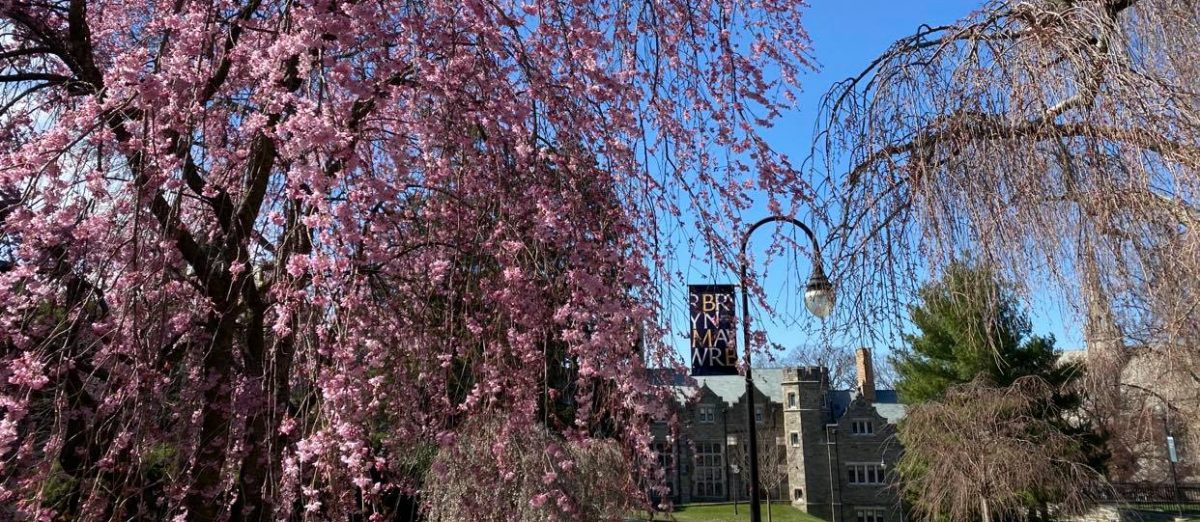The 14th of April, 2018 marked the first ever time that my roommate Tanjuma and I were away from home for Pohela Boishakh (the first day of the Bengali year). In Bangladesh, Pohela Boishakh serves as the biggest cultural celebration in Bangladesh. Thousands of Bengalis dressed in red and white welcome the new year. My homesickness hit an all time low that morning as my newsfeed on social media was filled with people celebrating this eventful day with their loved ones. However, the weather proved to be very nice on that Saturday (I soon learned to not take spring for granted because we had rain showers for the next two days), and my roommate was not one to sulk around in a corner even though we were halfway across the world from the New Year celebrations.
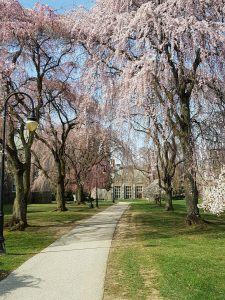 We tried our best to satisfy the red and white color code and spent an entire hour trying to take aesthetic pictures in front of Rock arch. After all, if taking fake candids with a breathtaking backdrop was the closest thing to celebrating Pohela Boishakh at Bryn Mawr College, then so be it. Jokes aside, the trees were in full bloom and the magic of spring’s arrival touched my heart. I started to realize that it was going to be a good day.
We tried our best to satisfy the red and white color code and spent an entire hour trying to take aesthetic pictures in front of Rock arch. After all, if taking fake candids with a breathtaking backdrop was the closest thing to celebrating Pohela Boishakh at Bryn Mawr College, then so be it. Jokes aside, the trees were in full bloom and the magic of spring’s arrival touched my heart. I started to realize that it was going to be a good day.
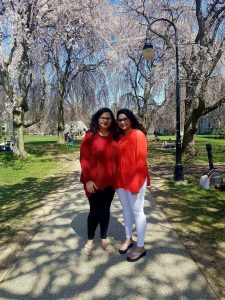
Starting this fall, Tanjuma and a few other Mawrters will start an internship under artist Tania El-Khoury. I for one, was never into art and was clueless of my best friend’s new obsession with this artist who is based in Beirut and London. A week earlier, she had convinced me to go into Philadelphia to attend a discussion featuring El-Khoury and a senior from Bryn Mawr. I readily agreed because I would never turn down a free trip to the city! Coincidentally, the event was on that beautiful spring day. Without having any prior knowledge of El-Khoury or her work as a live artist, I let my roommate tag me along to the lecture. It was being held at Twelve Gates Art Studio, and for the first time ever, I entered Philadelphia’s artistic wing. I saw streets filled with art exhibitions and people walking hand-in-hand, happy to be part of this world on that beautiful day. I never considered myself as much of an artist and was low-key wondering if this two hour Q&A session with this artist would be the perfect way to spend Pohela Boishakh.
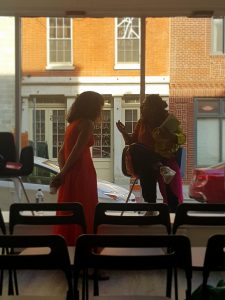
When we entered Twelve Gates, I saw a beautiful curly-haired woman flaunting a neon orange dress. She smiled at us when we walked in. The art studio eventually got a bit too crowded as the event was open to the public.
El-Khoury performs art in which the audience is made to live through any given experience mostly pertaining to ethical and political encounters. The majority of the conversation revolved around her work in Gardens Speak, an interactive sound installation containing the oral histories of ten ordinary people who were buried in Syrian gardens.
Each narrative had been carefully constructed with the friends and family members of the deceased to retell their stories as they may have recounted them. They are compiled with found audio that accounts their final moments. The audience, in groups of ten, were directed towards ten headstones each containing the story of one Syrian who had died during the uprising. The audience was then asked to dig the soil under their feet to uncover a headphone and a pillow. They were then requested to lie on the pillow as the account of one Syrian played in their headphones. El-Khoury told us that their letters built a striking contrast between what the uprising was built around versus what is happening in Syria today. I was awestruck because this was probably the closest to death that I could ever imagine coming across in my lifetime.
El-Khoury explained another live art performance in which she asked refugees to paint the hands of members in the audience without looking at them. Here, she tried to establish a connection between the audience and the refugee, hoping that somehow they would understand the struggle that the painter’s hands bear.
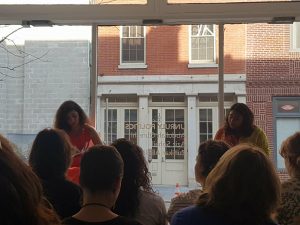 El-Khoury was a pleasant mixture of spice and sass; she seemed unapologetic and was very unbiased in her opinion regarding being labeled a feminist. I found myself staring at her with so much wonder, and taking in everything she had to say about the world, and how important it is for us to know about the struggle of surviving in places where it is very difficult to do so. She is an avid humanitarian, and from what it seems, she is clearly doing her part for this world. At the end of the presentation, I promised myself that I would be the first in line to watch Gardens Speak this September at Bryn Mawr. My heart was filled with hope and joy because this world still has strong, smart and sensible women like El-Khoury – what a wonderful end to the first day of the Bengali year!
El-Khoury was a pleasant mixture of spice and sass; she seemed unapologetic and was very unbiased in her opinion regarding being labeled a feminist. I found myself staring at her with so much wonder, and taking in everything she had to say about the world, and how important it is for us to know about the struggle of surviving in places where it is very difficult to do so. She is an avid humanitarian, and from what it seems, she is clearly doing her part for this world. At the end of the presentation, I promised myself that I would be the first in line to watch Gardens Speak this September at Bryn Mawr. My heart was filled with hope and joy because this world still has strong, smart and sensible women like El-Khoury – what a wonderful end to the first day of the Bengali year!
